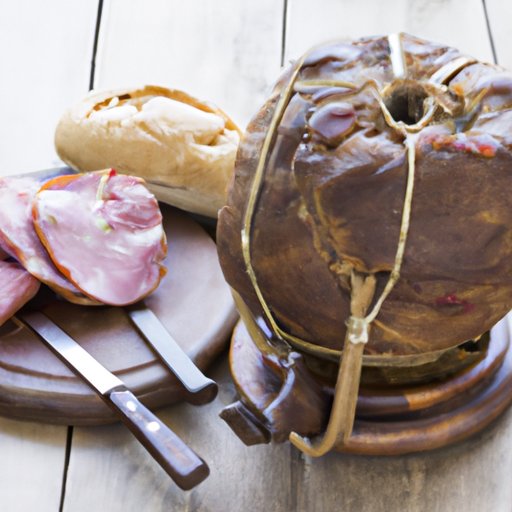
I. Introduction
Lent is a period of reflection and spiritual growth for many people around the world. One of the practices associated with this season is abstaining from meat on Fridays, and in some cases, for the entire season. However, many people have questions about this tradition. Can you eat meat during Lent? Are there exceptions to the rule? What nutritional implications may arise from giving up meat for an extended period? And what do religious leaders have to say about abstaining from meat as a way of deepening one’s spiritual connection with God? This article will explore all of these questions and more.
II. Historical Perspective on Abstaining from Meat During Lent
Abstaining from meat during Lent is a tradition that dates back centuries, and it has its roots in the Catholic Church. According to Catholic doctrine, Lent is a time of penance and spiritual purification leading up to Easter. By giving up meat, Catholics aim to make a sacrifice as Jesus did when he fasted for 40 days in the desert before beginning his ministry.
However, there are exceptions to this rule. For example, if someone has a medical condition that requires them to eat meat, they may be exempt from this practice. Additionally, if meat is the only available food, then it is permissible to eat. Finally, if someone is too poor to afford meat, they are automatically exempt from the rule.
III. Nutritional Ramifications and Incorporating Other Sources of Protein
While abstaining from meat can have spiritual benefits, it can also pose some nutritional challenges. Meat, especially red meat, is an important source of iron, protein, and other nutrients that are essential for good health. Without it, individuals may struggle to maintain adequate levels of these nutrients.
However, there are many other sources of protein and iron that can support good nutrition in a meat-free diet. For example, legumes such as beans and lentils are excellent sources of protein and are also high in fiber, which can promote regular digestion. Nuts and seeds are good sources of healthy fats and can also provide a source of protein. Tofu, tempeh, and other soy products can mimic meat in taste and texture and are also high in protein.
IV. Religious Perspective on Abstaining from Meat During Lent
For many Catholics, abstaining from meat during Lent is a way of showing solidarity with those who are less fortunate. By making a sacrifice, they are reminded of the many blessings they have and are encouraged to be more giving towards others. Moreover, giving up meat can be a deeply spiritual experience that helps individuals connect more deeply with their faith and with God.
According to the Catholic Catechism, “All Fridays through the year and the time of Lent are penitential days and times throughout the entire Church.” By offering up a sacrifice like giving up meat, Catholics believe they can unite themselves more closely to Christ’s passion and death, thereby deepening their own spiritual lives.
V. Meatless Meal Ideas
If you are thinking of giving up meat for Lent, it’s important to have a few good meal ideas in your repertoire. Here are a few tasty and nutritious options:
- Vegetarian chili made with beans, tomatoes, and spices
- Ratatouille made with eggplant, zucchini, peppers, and tomatoes
- Tofu stir-fry with lots of colorful veggies and quinoa or brown rice
- Roasted chickpea salad with mixed greens, roasted veggies, and a tahini dressing
- Vegetable curry with chickpeas, potatoes, and spinach

VI. Morality of Consuming Meat on Fridays During Lent for Medical Reasons
For Catholics or others who observe Lent, there may be situations where exceptions have to be made to the meat-free diet, such as for health reasons. In such cases, the question arises as to whether it is morally acceptable to consume meat on Fridays during Lent.
According to some religious leaders and moral philosophers, abstaining from meat is a way of making a sacrifice, and therefore, exceptions to the rule should be made only if absolutely necessary. One could argue that if someone’s health condition is so severe that they must eat meat, then they are already making a sacrifice and therefore do not need to abstain from meat for spiritual reasons. However, this is a complex issue that may vary depending on an individual’s circumstances.
VII. Cultural Examination of Lent Observances Around the World
Lent is observed around the world in many different ways, with some cultures abstaining from meat and others not. In some countries such as Italy and Brazil, abstaining from meat during Lent is a common practice. However, in other cultures such as Greece and Russia, the focus is more on giving up other indulgences such as alcohol or sweets.
For those who do abstain from meat, the practice can be deeply ingrained in the culture. For example, in Mexico, Catholics traditionally eat fish on Fridays during Lent, and the country has a long history of fish-based cuisine. In the Philippines, where more than 80 percent of the population is Catholic, many communities have processions and other religious events during Lent.
VIII. Expert Perspectives on Eating Meat During Lent
To gain a deeper understanding of the religious and cultural significance of abstaining from meat during Lent, we spoke with several experts in the field.
First, Father Michael, a Catholic priest, emphasized that abstaining from meat is not simply a matter of following a rule but rather a way of making a sacrifice as a way of deepening one’s spiritual life. He noted that while exceptions to the rule can be made, individuals should strive to make the sacrifice whenever possible.
Second, Maria, a nutritionist, highlighted the importance of maintaining good nutrition during Lent, even if meat is off the table. She suggested incorporating a variety of protein-rich foods such as beans, nuts, and tofu into the diet to ensure that nutritional needs are met.
Finally, Dr. Sarah, a moral philosopher, urged individuals to think deeply about their reasons for giving up meat during Lent and to consider the moral implications of choosing to do so. She emphasized the importance of making informed decisions that align with one’s personal values and beliefs.
IX. Conclusion
Abstaining from meat during Lent can be a powerful spiritual practice that helps individuals deepen their connection with God. It can also pose some nutritional challenges, but by incorporating other sources of protein into the diet, individuals can maintain good health while making a sacrifice. By exploring the cultural, spiritual, and ethical perspectives on this practice, readers can gain a deeper understanding of its significance and make informed decisions about how to observe Lent in a way that is meaningful and fulfilling for them.




